|
|
|
Sort Order |
|
|
|
Items / Page
|
|
|
|
|
|
|
| Srl | Item |
| 1 |
ID:
052314
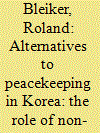

|
|
|
|
|
| Publication |
Spring 2004.
|
| Summary/Abstract |
Korea is one of the world's most volatile areas, not least because traditional UN mediation and peacekeeping missions are impossible. Having intervened in the Korean War on behalf of the southern side, the UN is a party to the conflict, rather than a neutral arbiter. The situation is particularly problematic because political interactions are characterized by a high degree of state-control over security policy. In both parts of the peninsula the state has, at least until recently, exercised the exclusive right to deal with the opponent on the other side of the hermetically divided peninsula. Given these domestic and international constrains, alternative approaches to conflict resolution are urgently needed. The recently proliferating literature on human security offers possible solutions, for it urges policy makers to view security beyond the conventional military-based defence of the state and its territory. Using such a conceptual framework, the essay assesses the potential significance non-state interactions between North and South, particularly those that promote communication, information exchange and face-to-face encounters. Even though these interactions remain limited, they are of crucial importance, for they provide an opportunity to reduce the stereotypical threat images that continue to fuel conflict on the peninsula.
|
|
|
|
|
|
|
|
|
|
|
|
|
|
|
|
| 2 |
ID:
052316
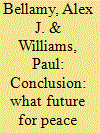

|
|
|
|
|
| Publication |
Spring 2004.
|
| Summary/Abstract |
This concluding essay discusses two contrasting agendas for future peace operations: the 'Brahimi agenda', the main elements of which resemble a problem-solving approach, and a 'critical agenda'. These agendas have different priorities but both contain important insights about how peace operations might be conducted more effectively. The essay begins by reflecting on the Brahimi agenda and suggests that some of its fundamental political insights have been sidelined during the implementation process. It then discusses one of the central challenges confronting peace operations, namely, how to deal with so-called 'spoilers'. We argue that while proposals for more privatized and regionalized peace operations may offer short-term palliatives in extreme circumstances, they suffer from several important limitations. The second section outlines how a critical agenda might contribute to making peace operations more effective in the short-term and making them redundant in the longer-term.
|
|
|
|
|
|
|
|
|
|
|
|
|
|
|
|
| 3 |
ID:
052315
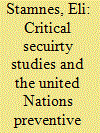

|
|
|
|
|
| Publication |
Spring 2004.
|
| Summary/Abstract |
This essay takes as it starting point that meta-theoretical assumptions affect our analyses of UN peace operations and have normative consequences. It demonstrates how this fact could be taken into account in such analyses by introducing an approach to the study of security - Critical Security Studies (CSS) - and by showing how the central ideas of this approach may be fitted into an alternative framework for analysis. This framework is based on the method of immanent critique and is in particular concerned with conceptions of security and human emancipation. An illustration of how this framework can be utilized to study the UN's preventive deployment in Macedonia is then provided. It is argued that some of this UN operation's activities can be regarded as contributions to a process of emancipation in Macedonia
|
|
|
|
|
|
|
|
|
|
|
|
|
|
|
|
| 4 |
ID:
052313
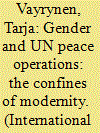

|
|
|
|
|
| Publication |
Spring 2004.
|
| Summary/Abstract |
The essay seeks to problematize the recent UN discourse on gender, peace and war by demonstrating how modernity sets the limits for the discourse, and therewith confines the discourse to the pre-given binary categories of agency, identity and action. It engages in an analysis of modernity and the mode of thinking that modernity establishes for thinking about war and peace. It is demonstrated in the text that new thinking on post-Westphalian conflicts and human security did open up a discursive space for thinking about gender in peace operations, but this space has not been fully utilized. By remaining within the confines of modernity, the UN discourse on peace operations produces neoliberal modes of masculinity and femininity where the problem-solving epistemology gives priority to the 'rationalist' and manageralist masculinity and renders silent the variety of ambivalent and unsecured masculinities and femininities
|
|
|
|
|
|
|
|
|
|
|
|
|
|
|
|
| 5 |
ID:
052307
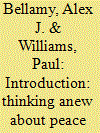

|
|
|
| 6 |
ID:
052312
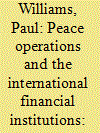

|
|
|
|
|
| Publication |
Spring 2004.
|
| Summary/Abstract |
This essay reflects critically upon the question of why peace operations become necessary in certain parts of the world. It does so by exploring why the policies of the International Financial Institutions (IFIs) should be understood as part of the explanation for war and genocide in Rwanda (1990-94) and war in Sierra Leone (1991-2002), which, in turn, eventually necessitated the presence of UN peace operations in these two states. The first section summarizes IFI engagement with the issue of violent conflict. This is followed by a critical evaluation of the ways in which in Rwanda and Sierra Leone, IFI policies helped fan the flames of war and genocide which UN (and other) peacekeepers were subsequently asked to put out. The final part reflects upon the relationship between IFI policies and peace operations in Rwanda and Sierra Leone. The essay concludes that the current regulation of the global capitalist economy and the philosophy underpinning IFI policies have fuelled patrimonial and authoritarian systems of governance in Rwanda and Sierra Leone. This has had disastrous consequences for both the citizens of these states and UN peace operations.
|
|
|
|
|
|
|
|
|
|
|
|
|
|
|
|
| 7 |
ID:
052309


|
|
|
|
|
| Publication |
Spring 2004.
|
| Summary/Abstract |
A deconstruction of the role of peace support operations suggests that they sustain a particular order of world politics that privileges the rich and powerful states in their efforts to control or isolate unruly parts of the world. As a management device it has grown in significance as the strategic imperatives of the post-industrialized, capitalist world have neutered the universal pretensions of the United Nations. Drawing on the work of Robert Cox and Mark Duffield, this essay adopts a critical theory perspective to argue that peace support operations serve a narrow, problem-solving purpose - to doctor the dysfunctions of the global political economy within a framework of liberal imperialism. Two dynamics in world politics might be exploited to mobilize a counter-hegemonic transformation in global governance. First, a radical change in the global trade system and its problematic institutions will create opportunities to emancipate the weak from economic hegemony. Second, future network wars are likely to require increasingly subtle and flexible teams, similar to disaster relief experts, to supply preventive action, economic aid and civilian protection. This might only be achieved by releasing peace support operations from the state-centric control system, and making them answerable to more transparent, more democratic and accountable multinational institutions.
|
|
|
|
|
|
|
|
|
|
|
|
|
|
|
|
| 8 |
ID:
052310


|
|
|
|
|
| Publication |
Spring 2004.
|
| Summary/Abstract |
Since the end of the Cold War, debate over international peacekeeping has been dominated by the question of the so-called 'right of humanitarian intervention'. Advocates of the right of intervention, largely Western states, have tended to uphold liberal internationalist claims that new international norms prioritizing individual rights to protection promise a framework of liberal peace and that the Realist framework of the Cold War period when state security was viewed as paramount has been superseded. In an attempt to codify and win broader international legitimacy for new interventionist norms, the International Commission on Intervention and State Sovereignty released a two-volume report, The Responsibility to Protect, in December 2001. In the light of this report and broader developments in international security in the wake of September 11, this essay suggests that rather than a moral shift away from the rights of sovereignty, the dominance of the liberal peace thesis, in fact, reflects the new balance of power in the international sphere. Justifications for new interventionist norms as a framework for liberal peace are as dependent on the needs of Realpolitik as was the earlier doctrine of sovereign equality and non-intervention.
|
|
|
|
|
|
|
|
|
|
|
|
|
|
|
|
| 9 |
ID:
052308


|
|
|
|
|
| Publication |
Spring 2004.
|
| Summary/Abstract |
To date, peace operations have been under-theorized. Where they have been studied conceptually, this essay argues, peace operations have been viewed through the lens of problem-solving theory. Although such approaches are useful and important, particularly because they help to guide future action, they provide only partial explanations and limit the scope of creative thinking and practice. This essay calls for a new stage of theoretical thought informed by critical perspectives. It argues that problem-solving and critical approaches to peace operations can be distinguished along three lines: their purpose, their understanding of the social world and their position on the relationship between theory and practice. It argues that only a broadening and deepening of the study of peace operations can move the study and practice of peace operations beyond its current, problematic, state.
|
|
|
|
|
|
|
|
|
|
|
|
|
|
|
|
| 10 |
ID:
052311
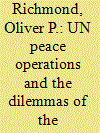

|
|
|
|
|
| Publication |
Spring 2004.
|
| Summary/Abstract |
What is the nature of the 'peace' that is being installed in conflict zones through UN peace operations? It tends to be assumed that UN peace operations contribute to the construction of a liberal international order made up of democratic states. In practice this has often resulted in a 'virtual peace' based upon contested attempts to import liberal democratic models. This essay argues that much of the impetus for this type of thinking arises from a liberal desire to 'resolve' conflict - to reproduce a positive peace through contemporary peace operations rather than the negative peace that was supported by more traditional peacekeeping. 'Peace' in some cases now legitimates and rests upon long-standing and deep interventions in conflict zones via a 'peacebuilding consensus'. This lies in a peace constituted by a specific form of external governance. Understanding these developments clearly shows how important peace operations are in creating forms of peace as a contribution to the remaking of the global order.
|
|
|
|
|
|
|
|
|
|
|
|
|
|
|
|
|
|
|
|
|